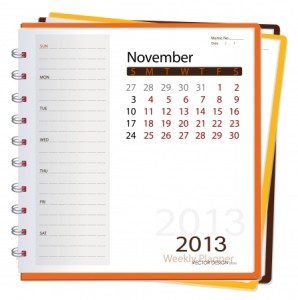 I hope you have decided to take the Write Nonfiction in November Challenge and join in the excitement of National Nonfiction Writing Month. (If you write fiction, you can try National Novel Writing Month.) When you set a goal to start and finish a work of nonfiction in a month, whether it’s a full-length book, a short ebook, an article, an essay, or some sort of report or proposal, preparation helps you achieve success. So, today I want to discuss a few of the different types of preparation you might undertake.
I hope you have decided to take the Write Nonfiction in November Challenge and join in the excitement of National Nonfiction Writing Month. (If you write fiction, you can try National Novel Writing Month.) When you set a goal to start and finish a work of nonfiction in a month, whether it’s a full-length book, a short ebook, an article, an essay, or some sort of report or proposal, preparation helps you achieve success. So, today I want to discuss a few of the different types of preparation you might undertake.
Research:
If your project entails any type of research, it will help you write quickly if you gather your research prior to Nov. 1. Organize it well so you can easily access whatever you need as you write. If you find you don’t have necessary research, don’t stop writing, if possible; instead place a bracket in your manuscript with the words [add research here], and just keep writing.
Outline:
Take the time to create an outline of your project. For a book, this could be a table of contents, and you could break the table of contents into smaller bits, like subheadings. For an article or essay, you might determine the major points you will discuss, arguments you will make or memories you will describe. Brainstorming your content and organizing it in advance allows you to power through your writing periods without wondering what you will write.
Materials:
Make sure you have all the materials you need at hand. This includes, of course, your computer. Also consider if your printer has enough ink in the cartridge, if you need pens or pencils, paper, certain books, or a binder for your printed pages. You might also want to stock up on your favorite snacks and drinks.
Schedule:
One of the most common reason people don’t follow through on their plans to write anything tends to be lack of time or “other commitments.” Plan out your schedule for the next month so you have ample time to meet your 30-day writing goal. Consider what can be put on the back burner for a month, how you will rearrange your life, and in what ways you will make time even when it seems you have none or little for this writing challenge.
Attitude:
Attitude makes a huge difference in whether or not you achieve your goals. Take some time prior to the start of the challenge to consider if you have self-defeating thoughts, such as:
- “I don’t really think I’ll complete my project, but I’ll see how far I get.”
- “I never finish anything I start.”
- “I never have enough time to challenges like this.”
- “My writing is no good; I don’t know why I try.”
- “I have nothing to say worth reading.”
If you do, now is the time to change them into positive affirmations. If you believe you can do something, you will—or you’ll find a way. Successful writers have willingness, optimism, objectivity, and tenacity. You will need all of these this month so you:
- Do whatever it takes to meet your goal.
- See obstacles as challenges and meet them head on.
- Offer yourself encouragement, rather than self-criticism, about your work.
- Act with persistence, determination and perseverance.
To learn more about “Author Attitude,” check out my new book The Author Training Manual, or register for Author Training 101.
Photo courtesy of jannoon028 / 123RF Stock Photo
I think NaNo tips are going to be very popular blog posts at the moment! Great ones here 🙂
Thanks, Charmain! Watch the firs week of November. The posts that week will have some nice tips, too.